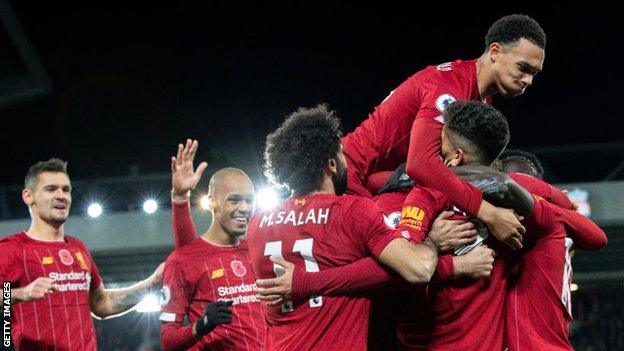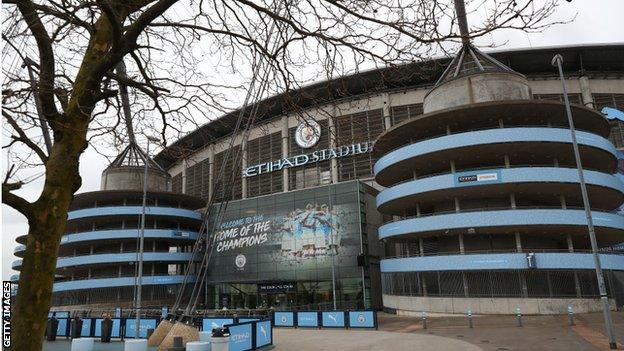Premier League 'Project Restart' Q&A: We answer some of the key questions
- Published

Liverpool, chasing their first title for 30 years, lead the table by 25 points with nine games remaining
The Premier League hopes for a return to action on 12 June, with matches played behind closed doors.
On Thursday, the UK government said it is "opening the door" for the return of professional football in England in June.
Culture Secretary Oliver Dowden said a meeting with the Football Association, Premier League and English Football League had "progressed plans".
But where will matches be played? And do the players support the plans? We answer some of the key questions about 'Project Restart'.
Do players and managers support the return?
Broadly, yes. But concerns were expressed in meetings with both this week about the timescale for a return.
One Premier League manager has told BBC Sport many of his colleagues felt the proposed 12 June return date was too soon.
There are issues to be addressed with medical and training protocols, which are due to be voted on when the clubs meet again on Monday.
One club official said younger players were more likely to want to play than older ones, who are more likely to take a wider view.
England defender Danny Rose doesn't like the plan at all: "I don't care about the nations' morale," he said on social media.
Brighton chief executive Paul Barber said clubs would be liable in the event of their staff suffering Covid-19 related health issues.
"We've got to make sure that we take every reasonable precaution in making sure that the environment they're being asked to return to is as safe as it can be," he said.
Where will games be held?
The Premier League clubs hope it will be at their own stadiums. The initial pushback against an apparent government desire for matches to be played at eight to 10 neutral grounds was from the six clubs at the bottom of the table as the concept affected the 'sporting integrity' of the league.
Now, faced with a £340m repayment to TV broadcasters even if matches go ahead, other problems have come to light that affect more clubs.
Emirates and Etihad Airlines, Amex, Vitality and King Power have spent huge sums for Premier League teams to play in stadiums named after them.
Sponsors pay for their names to be placed on LCD advertising boards. Clubs don't want to be negotiating rebates. Discussions with the authorities are on going.
What are the safety concerns around playing behind closed doors?
The Premier League and its clubs have stressed, repeatedly, that they will only return when it is safe to do so - and have assured everyone they will not take resource away from the NHS.
However, any game requires ambulances to be present. If the local NHS were not able to supply them, they would have to be done so privately.
Greater Manchester Police are uncomfortable with the idea of matches being staged at stadiums in their locality and it will - potentially - divert resources away from areas where they are most needed.
Old Trafford and the Etihad Stadium are home to two of the Premier League's biggest clubs and suggested 'neutral venues' if the decision was to go down that route.

Manchester City's Etihad Stadium has been touted as a potential neutral venue, although Greater Manchester Police says officers are 'fearful' of fans turning up outside behind closed doors matches
What is the training protocol for players and how soon can they step it up to team training?
This is so detailed. The information released to clubs, seen by the BBC, even extends to players being given a designated parking place at training grounds.
They must arrive in their kit, with their own towels and water bottles. They will all be screened for Covid-19 symptoms every day and have been advised to wear snoods or masks at all times on the training field.
Training routines must involve players maintaining the two-metre social distancing rules and, initially, be restricted to small groups. The hope is to move to more group-based sessions quite quickly.
But players and managers believe the lack of clarity around this creates uncertainty over when teams can realistically be expected to start playing competitive matches.
What is the testing programme and can it be implemented?
All players will be screened and tested repeatedly. It is estimated the Premier League are paying Hong Kong-based company Prenetics £4m for 40,000 home testing kits, with the information retained on a central data base.
Any player with symptoms must self-isolate for seven days. Anyone confirmed as having coronavirus - Brighton have had three players so far - or has had close contact with someone who has tested positive, must self-isolate for 14 days.
What extra medical support is needed?
Premier League clubs have some of the best medical facilities in the country. They will feel they have all the equipment necessary to deal with the issues created by Covid-19.
Before any player who has tested positive will be allowed to return to training, he will need to have a rigorous examination to ensure he is capable of high-intensity exercise. This includes checking heart and lung function and having blood tests.
Will what happens in Germany have an impact here?
Events around the Bundesliga resumption this weekend and beyond is bound to shape Premier League thinking.
It has been instructive that the 18 clubs have all stayed isolated in hotels this week to limit the chances of positive Covid-19 tests that would affect the resumption. Numbers at grounds have been limited to fewer than 250.
Outside of broadcasters, media representatives are restricted to 10 written journalists and one radio journalist. Whether fans turn up at stadiums will be of major interest.